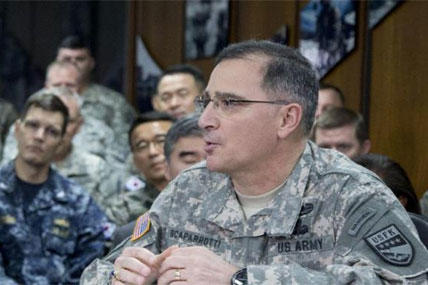The U.S. commander in South Korea said Thursday that he believes North Korea has the ability to fit a nuclear warhead to a long-range missile capable of hitting the U.S. mainland.
"I believe they've had the time and the capability to miniaturize" a nuclear weapon to arm North Korea's new KN-08 intercontinental ballistic missiles, Army Gen. Curtis M. "Mike" Scaparrotti told the Senate Armed Services Committee (SASC).
Scaparrotti, commander of U.S. Forces Korea, said "we must assume they have that capability" of hitting the U.S. Adm. Samuel Locklear, head of the Pacific Command, also testified and agreed with Scaparrotti's assessment of North Korea's nuclear capabilities but said they had yet to test the KN-08.
Sen. John McCain, R-Ariz., the SASC chairman, said the North Korean threat was enhanced by the unpredictability "of this overweight young man on the Korean peninsula" – meaning North Korean leader Kim Jong-un. Scaparrotti agreed and said "that's a disturbing factor."
Locklear and Scaparrotti backed up their earlier warning on North Korea's missile threat from Adm. William Gortney, commander of Northern Command and the North American Aerospace Defense Command.
At the Pentagon last week, Gortney said: "Our assessment is that they have the ability to put a nuclear weapon on a KN-08 and shoot it at the homeland We assess that it's operational today, and so we practice to go against it."
Gortney said the mobility of the KN-08s limits "our ability to get the indications that something might occur," but he maintained "high confidence" that U.S. anti-missile defense systems would be able to defend against a potential North Korean strike.
The SASC hearing also focused on China's efforts to build artificial islands in the South China Sea to enhance its territorial claims in the region. Adm. Harry Harris, who is slated to succeed Locklear at PaCom, recently called the artificial islands China's attempt to build a "Great Wall of Sand" against competing territorial claims.
Locklear said the overall policy of the Obama administration was that "we don't take sides in territorial disputes," but added that he has been taken aback by speed of China's land reclamation effort.
"How fast they've been able to do it has been astonishing," Locklear said.
"I think we have to watch this very carefully," Locklear said but did not give specifics on what the U.S. response should be.
-- Richard Sisk can be reached at richard.sisk@military.com





























